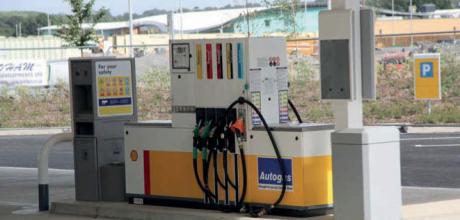Could LPG make a comeback in new improved ‘bio’ form?
Fifteen years ago or so, a mate of mine used to work for the Co-Op. And into his shop, one day, sauntered a reasonably well known former rock star — a man with the alcohol and subsequent money issues known to many former musicians after their fall from fame. Could he, he asked, start a tab for a bottle of wine? Unsurprisingly, my mate said no, in the nicest way that he could. A supermarket is not a pub, nor is it an overdraft, and credit isn’t usually extended. Our musician friend walked away, disappointed but understanding, and that was the end of it.
CLEANING UP
Our man Skelton’s found the ultimate in clean fuels for classics. There’s just one snag. You can’t buy it yet.
I raise this because what to many of us is a luxury was an expensive necessity to him, such was his dependency. And as fuel prices grow ever more ludicrous, there are many of us who feel similarly about petrol and diesel – with diesel getting dangerously close to £9 per gallon, it’s an essential of modern life that few of us can realistically afford. And it’s not like the alternatives are much better. The National Grid is close to capacity, and I’ve read that in some cases the Grid is trialling using plugged-in electric cars as batteries. The issue there is that while you might be used to store excess power, it might also be leeched for the good of the nation. Plug your car in at night ready for the morning trip to work and you might find yourself with less range the following morning. Vegetable oil isn’t safe in the majority of diesels without killing the fuel system. That old standby, LPG, is still a fossil fuel, and – eventually – prices will go up as the price of oil does the same.
But LPG as a concept gives us the ultimate solution. Because not only is it easy to convert a petrol car to run on LPG, there’s also a little known and vastly greener fuel that will work without modification in any LPG-compatible system. And it’s not oilbased at all.
BioLPG is already in use in the home energy industry, the result of some clever thinking by Calor Gas. It’s a byproduct of biodiesel, using renewable feedstocks to generate a product which is chemically identical to propane in every way, yet one that relies on plant and vegetable waste rather than dead dinosaurs to achieve the same effect. It’s claimed by its producers that it can cut CO2 emissions by up to 80% when compared with traditional LPG – a fuel which itself emits half the CO2 of petrol. In practical terms, a carbon footprint of just 1.1kg of CO2 per gallon against petrol’s 11kg means that BioLPG would cut the emissions of my Range Rover V8 to the point whereby even a Honda Insight running on petrol would emit almost double the carbon dioxide.
Using your classic is vastly better for the environment than manufacturing a new electric car but as we head toward net zero, our cars are being penalised because their tailpipe emissions are unfriendly in modern society. I genuinely think that a fuel which can improve those emissions by such a degree without the need for extensive underbonnet changes is the answer to the question we’re all asking – and I for one want to see if we can make this work. If using BioLPG means we can continue to use our classics in an environmentally conscious world, sign me up right now.
I’ve asked Calor for clarification on its plans for the automotive sector, and I hope to be able to offer some positive news soon. We were once told by a famous frog that it wasn’t easy being green. But when the solution’s already out there, how hard can it be?


